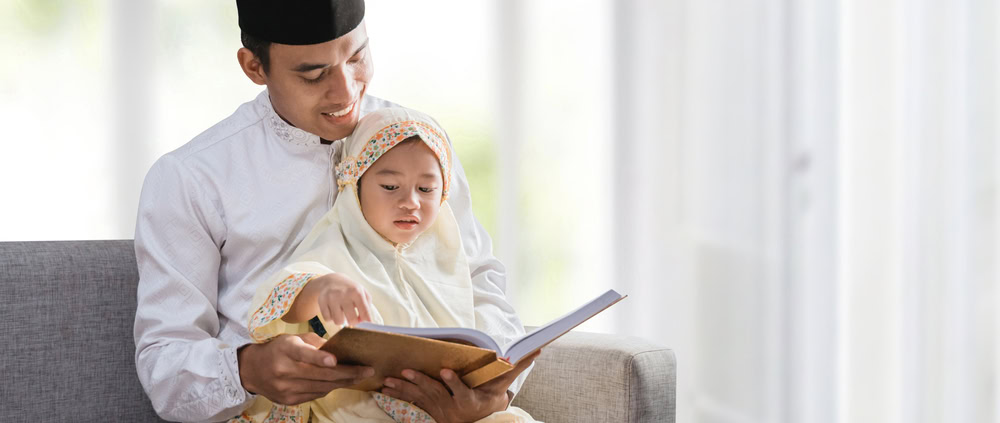What is the ruling on raising children?
Answered by Shaykh Khalid al-Kharsa
Question
What is the ruling on raising children?
Answer
In the name of Allah, Most Gracious and Merciful,
Raising children with correct discipline is obligatory upon the parents, and they are rewarded for it, and they would be sinful for neglecting it.
Raising children is an obligation upon the parents. Allah, the Exalted, says, “O believers! Protect yourselves and your families from a Fire whose fuel is people and stones, overseen by formidable and severe angels, who never disobey whatever Allah orders—always doing as commanded.” (Quran, 66:6).
Ibn Umar (Allah be pleased with him and his father) reported that Allah’s Messenger (Allah bless him and give him peace) said, “Each of you is a shepherd, and each of you is responsible for his flock. The ruler is a shepherd, and he is responsible for his flock. A man is a shepherd for his household, and he is responsible for his flock. A woman is a shepherd of her husband’s home and her children, and she is responsible for her flock. A child is a shepherd of his father’s property and he is responsible for his flock. A servant is a guardian of his master’s property, and he is responsible for his flock.” [Bukhari, Muslim]
Our homes are not uniform in upbringing. In some homes, a child is raised in cowardice and fear, indulgence and chaos, and pampering that corrupts the innate nature and kills uprightness, being ignorant and far from social manners, living in luxury, distant from participating with family and neighbors in both their joys and their sorrows. They employ a religious upbringing that is deviant and detached from faith and the true religion. Therefore, it is obligatory for the parents to bear their responsibility in this world and the Hereafter, to fulfill the duty of upbringing, and to seek advice from experts.
For more, see: Muhammad Rida al-Qahwaji, Waqfat ma’. tarbiyat al-Awlad
[Shaykh] Khalid al-Kharsa
Shaykh Dr. Muhammad Khalid al-Kharsa is a distinguished scholar from Syria, born in Damascus in 1960. He holds a bachelor’s degree from the Faculty of Da‘wa Islamiyya in Tripoli, a higher diploma in Comparative Fiqh from the University of Omdurman in 1998, a master’s degree in Comparative Fiqh from the Faculty of Shari‘a and Law at the University of Omdurman in 2002, and a Ph.D. in Comparative Fiqh from the same institution in 2010.
He acquired knowledge and spiritual guidance from Shaykh Muhammad Salih al-Farfur, Shaykh Abdul Razzaq al-Halabi, Shaykh Muhammad Adib al-Kallas, and Shaykh Abdul Rahman al-Shaghouri, may Allah have mercy on them all.
He received Ijazas from several scholars, including Shaykh Muhammad Amin Siraj, Shaykh Abdul Ghani al-Daqar, Shaykh Muhammad Sa‘id al-Kahil, Shaykh Malik bin al-Arabi bin Ahmad al-Sharif al-Sanusi, Shaykh Muhammad Usman Bilal, the Mufti of Aleppo, and others.
Shaykh Khalid lived in Damascus for 52 years, where he engaged extensively in educational and social activities before being displaced from there. He moved to Istanbul at the end of 2015 and co-established “Markaz Jami‘at al-‘Ilm Wa al-Hidaya” within two months of his arrival. In Istanbul, he is active in educational roles. He serves as the director and teacher at the Sheikh Abdul Razzaq al-Halabi Institute, a lecturer at Dar al-Fuqaha, and a teacher at the Dar al-Funun Waqf.
His scholarly works and research include his tahqiq on “al-Rasa li al-Salihat min al-Nisa” by Hafiz Yusuf bin Abdul Hadi, “Adab al-Murta‘i in the Science of Dua (Supplication),” “al-Isti‘ana bi al-Fatiha,” “Rashat al-Aqlam – Explanation of Kifayat al-Ghulam” by Shaykh Abdul Ghani al-Nabulsi in Hanafi Fiqh, “al-Hada’iq al-Wardiyya fi Ajla al-Naqshbandiyya” by Khani, and “al-Arba‘in al-Tusiyya” by Muhammad bin Aslam. May Allah preserve him and make his contributions beneficial.
